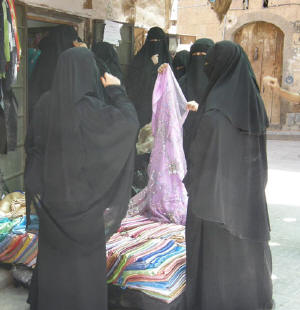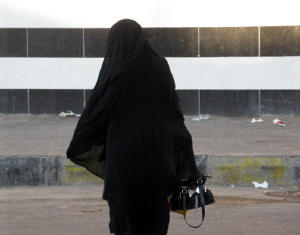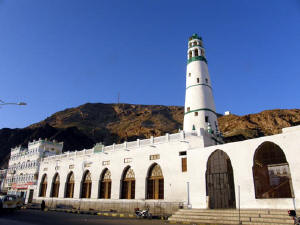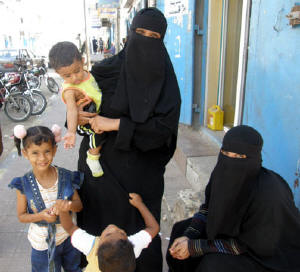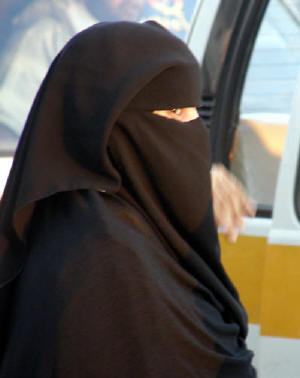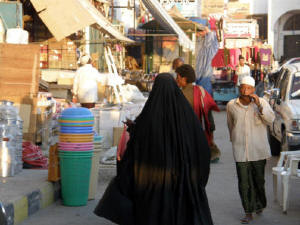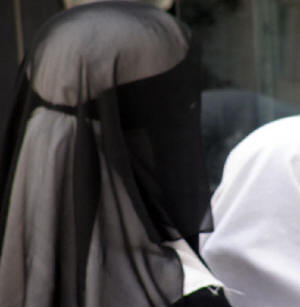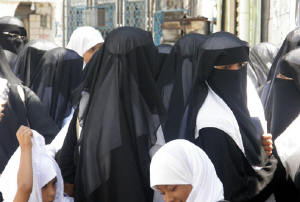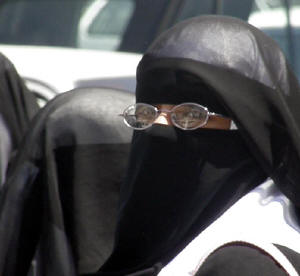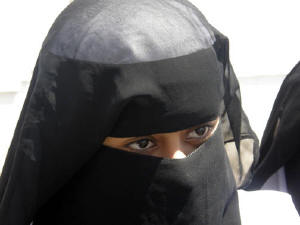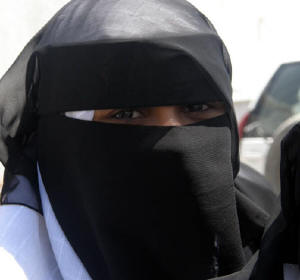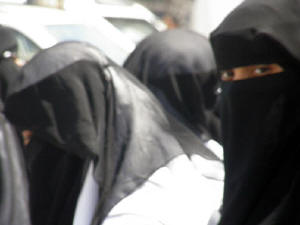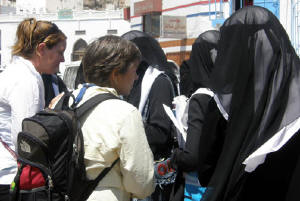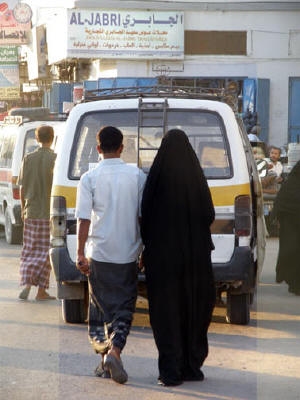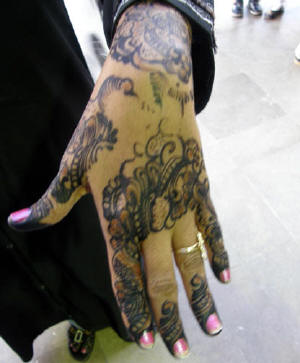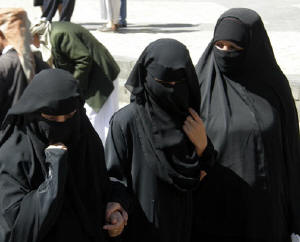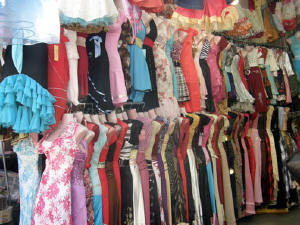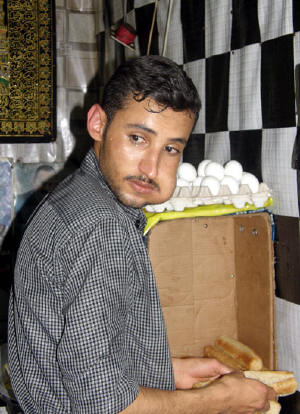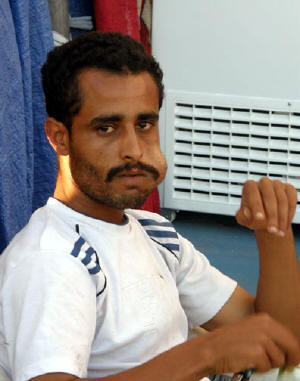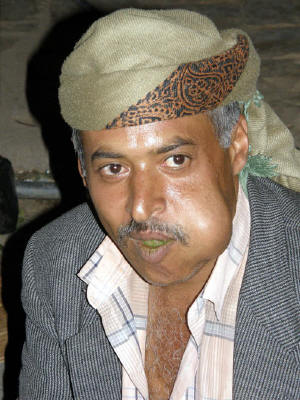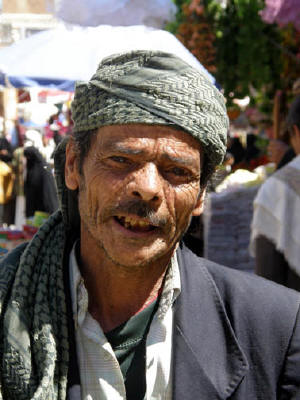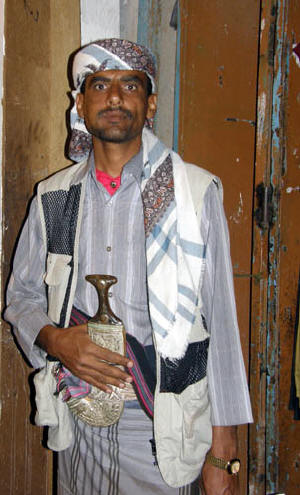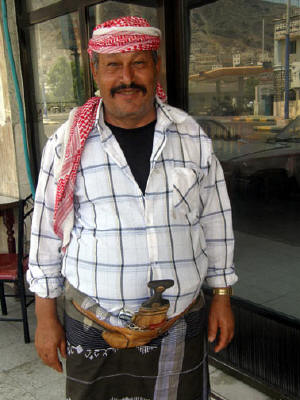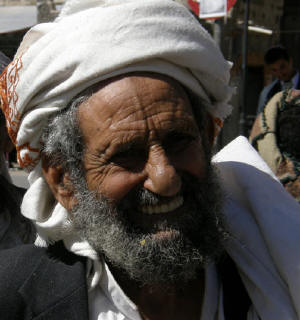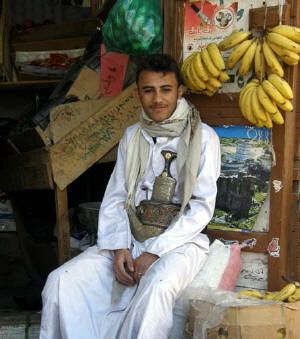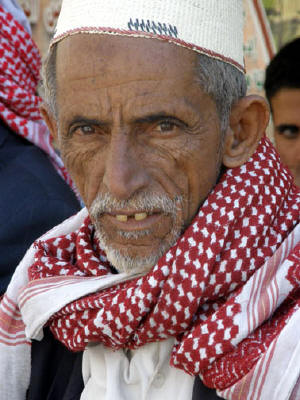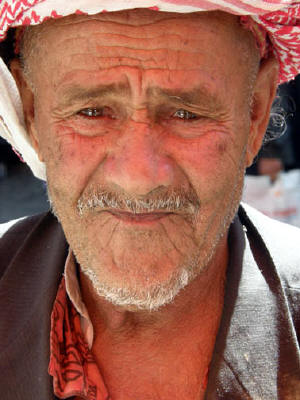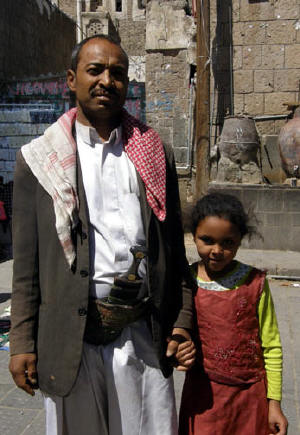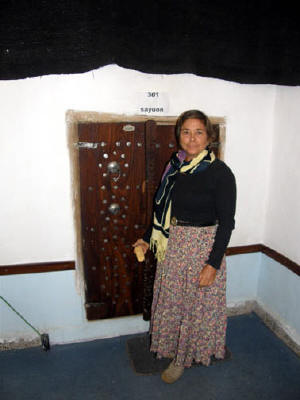Singapore
Malaysia Thailand
SE Asia Burma
Cambodia Vietnam
Laos Sri Lanka
Maldives Oman Yemen

Yemen is one of the most interesting and unique countries we have ever traveled to but before we could enjoy it we had a challenge ahead of us.
Passage through Pirate Alley
From Salalah in Oman to Aden in Yemen our route would take us through the pirate infested Gulf of Aden. Hijackings had now become a weekly occurrence and we were very nervous. The waters were being patrolled by Navy ships from over half a dozen countries and they had set up a security corridor which they wanted all the cargo ships, oil tankers and yachts to pass through and which they were to patrol. Even with dozens and dozens of Navy ships the area to be covered was huge so rarely would patrol ships be very close by. A disadvantage for us was that the corridor was nearly 120 miles out of our way and getting to and from it would put us in the danger zone for more time. In the end most yachts decided to stay close to the Yemen coast and bypass the corridor and we all tried to sail in convoys and match our speeds so we could stay close together - a very difficult thing for sailboats to do.
Sailing in convoy provided us moral support but in truth if one yacht was under attack a nearby yacht could have done nothing to deter or prevent it. Nevertheless we sailed with 3 other boats and tried to always stay within 1/4 mile of each other. At night we sailed without lights and we maintained radio silence most of the time. If we did break radio silence we used a pre-arranged code so the pirates monitoring the frequencies would not know where we were or where we were headed. Our best hope was that so far they had mostly attacked large ships worth millions of dollars.
Our first leg was in company with 3 other boats to the seldom visited village of Nishtun. Unfortunately upon arrival there one boat had a transmission problem and was concerned about going on. From Thailand to the Mediterranean it is 5,000 miles and 6 months and for that entire time there are really no marine services. Their best option for repairing it would be behind us and a detour to Muscat in Oman. They decided to turn back, a decision which while wise would likely delay their trip to the Mediterranean by an entire year as they would miss the weather window for transiting the Red Sea. Next morning they headed back and the other 3 of us continued on a two day passage to our next stop- Al Mukulla, near where there have been pirate attacks.
Pirate attack
Just as we had begun to relax a bit about the pirate threat we heard on the
radio a live pirate attack on the merchant vessel Diamond Falcon only 30 miles
from where we were. First we heard the Captain's frantic calls to the
warships patrolling the area saying he was being chased by Somali pirates and
giving his position. Immediately he was answered by the closest war ship
and they turned in his direction and dispatched a helicopter towards him. The pirates were firing automatic weapons at him and blew out the glass windows
in the bridge. We listened as the freighter called out minute by minute how
close the pirates were to him and how they were trying to board his ship while
he was evading but they were getting closer and closer. Every few minutes
the Navy helicopter pilot came on telling the freighter how close he was
to arriving on scene.
The panic in the Captain's voice and the adrenaline filled but calmer
response of the helicopter pilot both came clearly through our VHF radio's
speaker. The chase and evasion went on for about 20 very tense minutes and
it sounded like the pirates would be onboard before the navy arrived. Then with
literally seconds to spare the helicopter came over the horizon and the pirates
fled the area. Later the navy boat tried to investigate but the pirate's
speed boats were mingled in with other fishing boats and the AK 47's had been
hidden away so no one was caught. The freighter Captain kept thanking the
helicopter pilot for saving the lives of him and his crew.
For us it was very sobering - the freighters can go 15-20 mph and try to evade
the pirate speed boats which can go 25-30 mph. Since the speed difference
between them is not much it takes the pirates a long time to overtake the
freighter and hopefully help arrives in the meantime as it did for the Diamond
Falcon. But our sailboats only go
about 5-6 mph so any chase would be over in minutes- long before help would
arrive and even with 3 sailboats
together we could offer no resistance whatsoever.
While that attack was thwarted later in the week pirates took over a merchant ship, and during the next month they attacked the Maersk Alabama taking its American Captain hostage. That same month they also captured a small French flag yacht about the size of Ventana. Fortunately in those two cases the navies were able to rescue the hostages - though tragically the French yacht owner was killed during the rescue attempt to save his family and crew.
None of us had the presence of
mind to record the very dramatic initial VHF radio calls but our friends on Delicate Dawn
recorded the later transmissions.
Click the text below to hear a few of the transmissions.
They attack.... they are fighting me
Al Mukulla, Yemen was our first exposure to an Arab country where nearly all the women are dressed completely from head to toe in shapeless black robes known as burkhas or abeyas.. All but a few of them also had veils over their faces so the only part of them showing would be a slit where their eyes were. Some even went so far as to have a gauzy veil over their eyes so they could see out but no one could see them. Many also wore black gloves to even hide their hands. And all this in 100 degree heat. The burkhas fit like shapeless black bags so every woman becomes an anonymous hidden specter. And as all you can see are a bit of their eyes it is nearly impossible to guess their expressions. It seemed to us that you could walk right past your mother, sister or wife on the street and never recognize her as they all look the same. The men were dressed variously in Arab robes or western clothes and if they saw me looking at them they often froze with stern expressions on their faces and insisted I take their picture. However I was forbidden to take any woman's picture and advised to not even make eye contact with them for fear of offending their male relatives.
The men would spend hours each day in the street cafes drinking coffee or tea, playing dominoes and smoking large water pipes but women were never seen there and only on very rare occasions did we ever see a woman in a restaurant. If a woman was traveling with her male relative and had to eat in a restaurant she would be placed at a table in the very back corner of the restaurant and hidden behind a portable screen. Then the restaurant staff would pass the food behind the screen to the husband so there was no risk of her face being seen. It is as if their society wants women to pretend they don't exist. All socializing in public is men only and the men greet each other very affectionately with warm, almost sexual kisses on each cheek, while they hold each others heads in both hands. They often walk the street holding hands as well.
It is hard to describe the effect on a normal western male to go weeks without ever seeing a woman's face. It was like an entire culture with only one gender. But then walking through the markets we saw stores with incredibly fancy women's clothes and the very upscale Aden mall which we later visited had several stores that looked like Fredrick's of Hollywood. Yet the average woman would never be seen dressed in "normal" clothes except by her husband or by other women. Even at a family gathering the women would be separated and a man would likely NEVER EVER see the face of his own brother's wife.
Once when walking through a crowded market I stopped suddenly and one of the shapeless black figures walking behind me bumped into me quite hard. To my complete amazement I realized there were very soft breasts under those black sacks. Later I was to realize that not only were there breasts, but in fact complete women with all the hopes and desires and dreams that women everywhere have.
For me it was impossible to reconcile that concept that the self effacing, nearly invisible creatures I saw wearing black sacks had on underneath them Levis or fancy dresses, eye make-up, hennaed hands and feet and make-up- yet no one but other women would see all this. From birth their fathers dictated what they did, how they dressed, where they went and who they married. After that their husbands dictated what they did, who they saw, how they dressed and to whom they spoke.
In a recent World Economic Forum Global Gender Gap Index Yemen was ranked 130 out of 130 countries. Girls are often forced into marriage before they reach 15 years old and women's literacy is only 33%.
At one point we took an airplane to see the capital city. On the flight was a woman in her late 20's or early 30's traveling alone and wearing the traditional abeya robe and head scarf but not wearing a veil. Her face was uncovered and she was very pretty. The plane was open seating and she boarded early and sat by herself. In the US if a beautiful woman is alone with an empty seat next to her there is no doubt that it would soon be filled with an admiring male showing some interest. Amazingly in Yemen no men took the seat. Maybe they considered this showing their respect, maybe they were too intimidated, I do not know. Whatever their reasons I chalked it up to the very bizarre roles they have defined for men and women in their society.
It seems by their definitions a woman can bring shame on her family by any number of actions we would consider normal and innocent. If she does this in some Islamic cultures her brothers or father have the right to kill her. There are actions which may bring shame on the family but conversely there are no actions a woman could do to bring glory or respect to her family. It sounds like a game which they cannot win and the best they can hope for is not to lose.
What made this all even harder for us to understand is that the Burkah and face coverings in Yemen are fairly new. The women over 30 were never raised having to cover up but the new rise in fundamentalist Islam now demands it.
From Al Mukulla we had two more very tense days and nights transiting the pirate infested waters until finally making our landfall at Aden in Yemen where we felt safe again. In Aden we managed to get a broken alternator mount welded and restocked on groceries. From here we would not see anything resembling a supermarket until Egypt in about 6 or 7 weeks.
To enlarge any photo click on it then click on the back button to return here
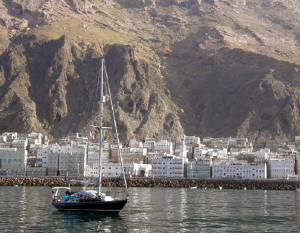
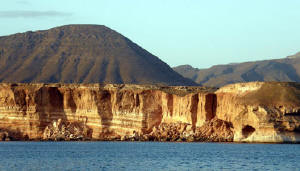
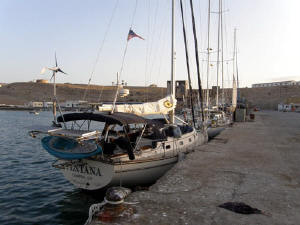
Delicate Dawn in Al Mukulla,
Cliffs at Nishtun
Ventana on the dock in Nishtun
Refugee Tragedy
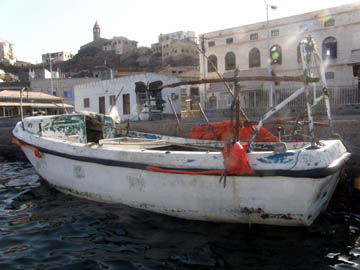
While we were in Aden a boatload of refugees from war ravaged Somalia arrived
there. The boat was an open fishing boat about 24 feet long. In the
US you see countless numbers of these on every lake and bay with two or three
fishermen aboard. The Somali boat was packed with nearly 90 people.
Can you conceive of how desperate someone would have to be to climb on a 24 foot boat packed with 90 others and go into the open ocean. After days at sea they were finally towed into port in Aden and when they got alongside the dock they were all so desperate to get ashore the entire group rushed to the side of the boat towards the dock which caused the boat to capsize. Five people were trapped under the boat within feet of the dock and drowned. After risking their lives at sea they drowned within feet of safety. How does one comprehend something like that?
Refugee boat- this tiny boat carried nearly 90 desperate Somali refugees, some
of whom drowned within 5 feet of safety
Throughout all Islamic countries the day starts at dawn with the wail of the muezzin's prayer blasting from loudspeakers perched on every minaret in the city. It seems the mosques compete with each other to see which can be the loudest. Then throughout the day this is repeated 4 more times and each time EVERY Moslem is expected to stop what they are doing, face Mecca and get on their knees to pray. If that is not enough of a constant reminder that you are in an Islamic country, consider the bookstore pictured below- 2,000 books in stock- but all 2,000 are the same book- the Koran.
Sana'a
Sana'a, the capital of Yemen is likely the most
interesting and different place we have ever traveled. We spent two days
in the inner city in what would be considered the most touristy area of the
entire country and yet we saw only about 5 other foreigners. In fact in
the two weeks we spent in Yemen, other than sailors like ourselves, we saw less
than a dozen westerners or tourists of any sort.
The walled inner city of Sana'a is very traditional, with unique architecture and decorative buildings. Most of the buildings were tall and skinny, with a winding stairway that went up the middle of the building. The doorways to the rooms were about 4' high.
The men and women in Sana'a were as traditional as the buildings with most all the women fully covered in black abeyas and the men in traditional white robes called thobes. The men usually wore the ceremonial dagger called a jumeriah. We stood out as foreigners and since tourists are so uncommon we were a total novelty to them. A great many people stopped to say "Welcome to Yemen" and if they spoke a bit more English they would ask where we were from.
Traveling throughout Asia you are endlessly approached to buy all manner of tourist trinkets and veteran travelers perfect their techniques of blowing off the persistent sellers. Yemen was to be totally the opposite. At the stalls in the market if we stopped to look at what they were selling it was usually offered to us as a free gift. Shops selling frankincense and myrrh, or coffee or nuts or sweets or fruits all insisted on giving us free samples. Everywhere we went people just wanted to make sure we liked their country. We went down dozens of back alleys and never once felt anything but totally safe and welcomed.
Inevitably we got lost as the inner city is a complete maze of pathways in all directions. Each time we got lost someone would ask where we needed to go, then calmly walk 20 minutes out of their way to lead us to our destination. In many countries this is a normal tourist scam and the guide then demands an outrageous amount of money. In Yemen they all refused to take anything, even refusing to let me buy them a soft drink.
On one occasion we asked someone to point us in the right direction for an area where we thought we could find stalls selling kebabs for lunch. He immediately indicated we should follow him and began racing through the alleyways of the souk stalls. We could barely keep up but at every corner he would wait and signal to us then race on. Finally he led us to a shop that was packed with hundreds of men streaming in and out. We are pretty adventurous but this was the kind of place we would NEVER have gone into on our own. He led us past the kitchen and open fire pit and up some rickety stairs to a second floor, then sat us on benches at a long metal table with a dozen other men, then raced away. Dee was the only woman in the place of course. There were no plates or utensils. The men at our table just passed us some bread which they had bought outside before they came to the restaurant and indicated we should dip it into the communal hot pot in the middle of the table. Minutes later our guide returned with a dozen pita loaves and some kebabs and together we just dug in to the bowl. When the men who had first been there left, their seats on the bench were immediately taken by others who sat and dipped into the bowl with us. We were eating salta, the delicious Yemen national dish, a mixture of minced lamb vegetables and spices. Everyone ate very quickly and when the meal was over we went outside and our new friend bought us cups of steaming tea. He told us the restaurant only opens for one hour at lunch and it would be empty in minutes. He asked if we liked it, then said goodbye and was ready to race off having paid for our lunch and tea. I quickly caught up to him and pressed some money into his hands which he accepted but clearly did not expect. Another example of the Yemeni people who just wanted to make sure we enjoyed their country.
Despite the Islamic culture which prohibits alcohol and drugs, Yemen has a very serious problem of the use of a legal and indigenous drug called Gat. Every day starting mid afternoon about 75% of the men start chewing gat which is a mild narcotic. By early evening they have a giant wad of gat leaves in their cheek and their brain function reduces to about half. Not only does it render the men useless but it is very expensive as well.
Yemen is on the US state department list of dangerous countries and they advise US citizens to stay away because it has links to Al Queda and has been the site of terrorist actions against tourists. However if you are looking for a place to go that is unique and very far off the tourist track give it a try.
To enlarge any photo click on it then click on the
back button to return here
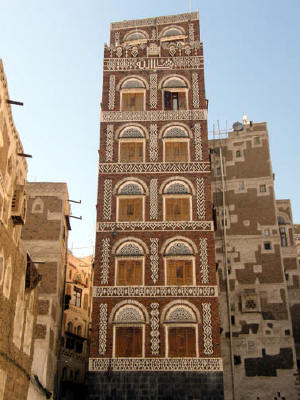
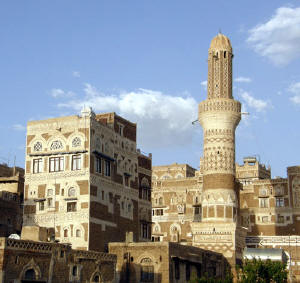
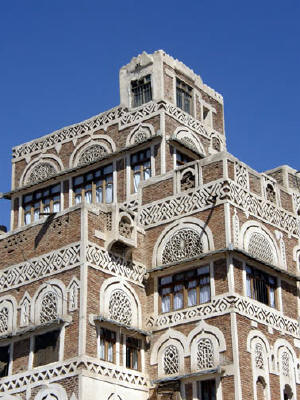
Buildings in the old walled city of Sana'a
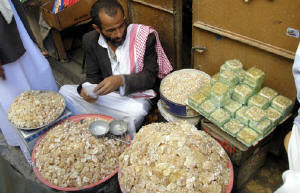
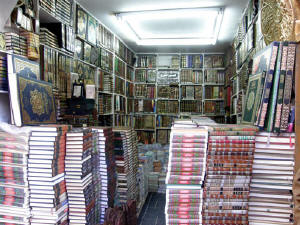
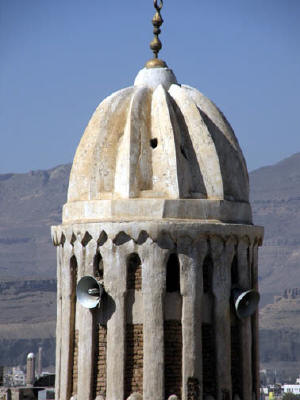
Selling frankincense and myrrh
Bookstore with only one book- the Koran Loudspeakers for
calling out prayers 5 times a day
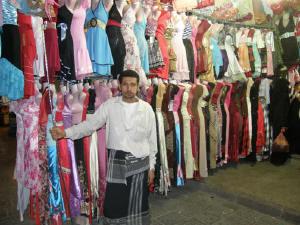
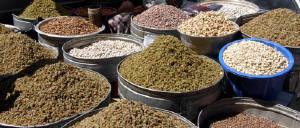
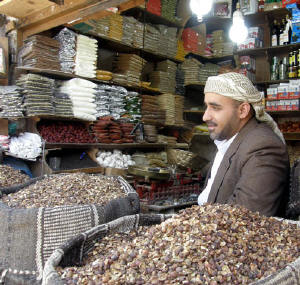
Fancy dress shop
Selling raisins and nuts
Coffee bean husks for making a drink called Quisher
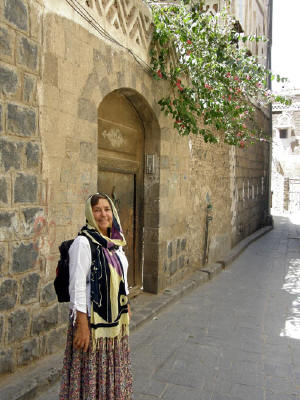
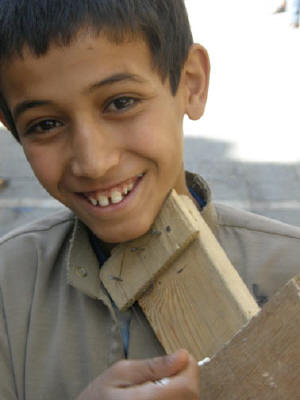
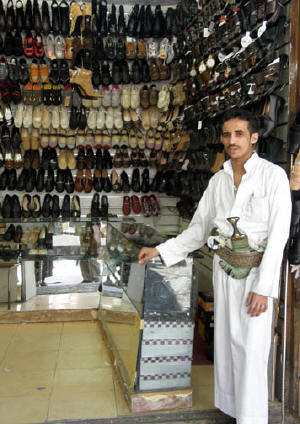
Dee in Sana'a
Homemade violin
Shoe store
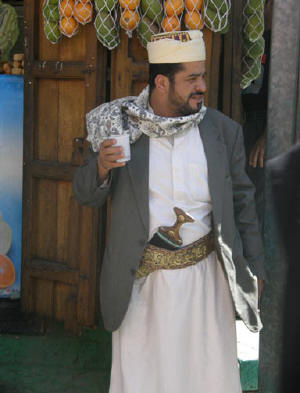
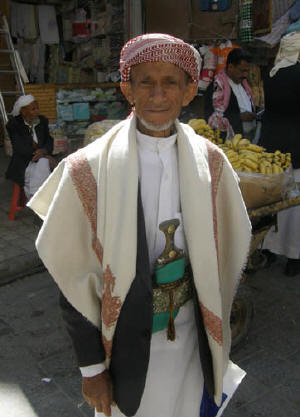
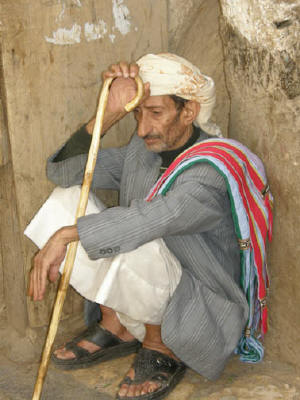
Traditional thobe robe and Jumeriah dagger
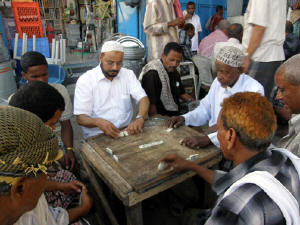
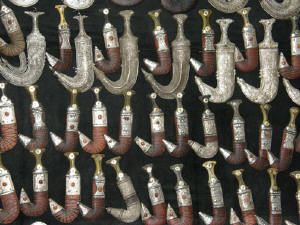
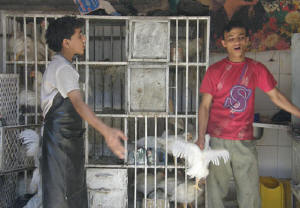
Men's domino game
Traditional daggers
Shop selling chickens which they
killed for you on the spot


















